Virginia Western Community College’s (VWCC) general education success is measured using artifact-based direct assessment and survey-based indirect assessment.
As mandated by the State Council of Higher Education for Virginia (SCHEV), six general education competencies are measured in accordance with the VWCC General Education Assessment Plan (DOCX).
VWCC measures the following six general education competencies:
- Critical Thinking
- Scientific Literacy
- Professional Readiness
- Civic Engagement
- Quantitative Literacy
- Written Communication
Critical Thinking
If you would like the complete report for Critical Thinking, please email ie@virginiawestern.edu.
Definition: Critical thinking is the ability to use information, ideas, and arguments from relevant perspectives to make sense of complex issues and solve problems.
Direct Assessment
Goal: Students will have an average score of 3.00 or better when assessed via the critical thinking rubric. The maximum score is 4.00.
Threshold of Acceptability: 75% of students will earn a score of 2.00 or better on the artifact-based critical thinking assessment. Additionally, students will have an average score of 2.00 or better.
Results:
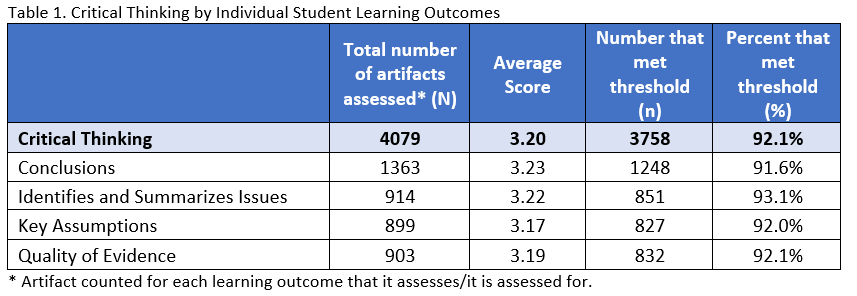
Conclusion: In 2023-24, 92.1% of students scored 2.00 or better; this meets the threshold of acceptability. With an average score of 3.20, the goal of 3.00 was also met.
Indirect Assessment 1: Graduation Survey
Goal: Graduates will have an average satisfaction score with their critical thinking education of 3.00 or better. The maximum score is 4.00.
Threshold of Acceptability: 85% of graduates will rate their satisfaction with their critical thinking education as a 3.00 or better.
Results:

Conclusion: In 2024, 100.0% of graduates rated their satisfaction with their critical thinking education as 3.00 or better; this meets the threshold of acceptability. With an average satisfaction score of 3.68, this also meets the goal.
Indirect Assessment 2: Alumni Survey
Goal: Alumni will have an average satisfaction score with their critical thinking education of 4.00 or better. The maximum score is 5.00.
Threshold of Acceptability: 85% of alumni will rate their satisfaction with their critical thinking education as a 3.00 or better.
Results:

Conclusion: In 2022, 97.0% of alumni rated their satisfaction with their critical thinking education as 3.00 or better; this meets the threshold of acceptability. With an average satisfaction score of 4.30, this also meets the goal.
Scientific Literacy
If you would like the complete report for Scientific Literacy, please email ie@virginiawestern.edu.
Definition: Scientific literacy is the ability to apply the scientific method and related concepts and principles to make informed decisions and engage with issues related to the natural, physical, and social world.
Direct Assessment
Goal: Students will have an average score of 3.00 or better when assessed via the scientific literacy rubric. The maximum score is 4.00.
Threshold of Acceptability: 75% of students will earn a score of 2.00 or better on the artifact-based scientific literacy assessment. Additionally, students will have an average score of 2.00 or better.
Results:
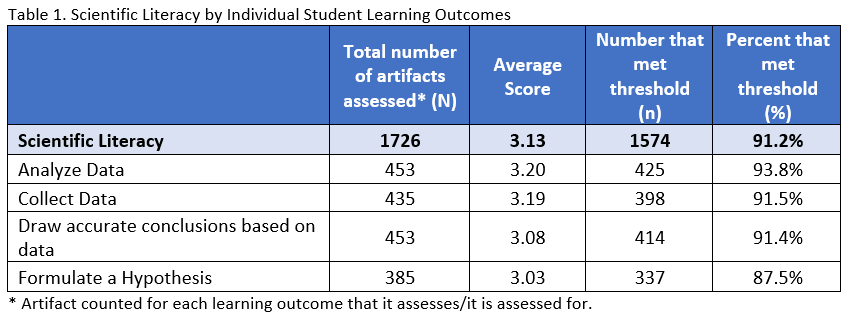
Conclusion: In 2023-24, 91.2% of students scored 2.00 or better; this meets the threshold of acceptability. With an average score of 3.13, the goal of 3.00 was also met.
Indirect Assessment 1: Graduation Survey
Goal: Graduates will have an average satisfaction score with their scientific literacy education of 3.00 or better. The maximum score is 4.00.
Threshold of Acceptability: 85% of graduates will rate their satisfaction with their scientific literacy education as a 3.00 or better.
Results:

Conclusion: In 2024, 98.6% of graduates rated their satisfaction with their scientific literacy education as 3.00 or better; this meets the threshold of acceptability. With an average satisfaction score of 3.69, this also meets the goal.
Indirect Assessment 2: Alumni Survey
Goal: Alumni will have an average satisfaction score with their scientific literacy education of 4.00 or better. The maximum score is 5.00.
Threshold of Acceptability: 85% of alumni will rate their satisfaction with their scientific literacy education as a 3.00 or better.
Results:

Conclusion: In 2022, 97.7% of alumni rated their satisfaction with their scientific literacy education as 3.00 or better; this meets the threshold of acceptability. With an average satisfaction score of 4.24, this also meets the goal.
Professional Readiness
If you would like the complete report for Professional Readiness, please email ie@virginiawestern.edu.
Definition: Professional readiness is the ability to display the crucial skills of situational and culturally appropriate communication, demeanor, and behavior in the classroom or workplace.
Direct Assessment
Goal: Students will have an average score of 2.50 or better when assessed via the professional readiness rubric. The maximum score is 3.00.
Threshold of Acceptability: 75% of students will earn a score of 2.00 or better on the artifact-based professional readiness assessment. Additionally, students will have an average score of 2.00 or better.
Results:
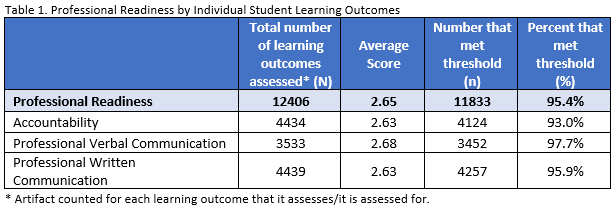
Conclusion: In 2024-25, 95.4% of students scored 2.00 or better; this meets the threshold of acceptability. With an average score of 2.65, the goal of 2.50 was also met.
Indirect Assessment 1: SDV Survey
Goal: SDV students will have an average satisfaction score with their professional readiness education of 3.00 or better. The maximum score is 4.00.
Threshold of Acceptability: 85% of respondents would rate their satisfaction with their professional readiness education as a 3.00 or better.
Results:

Conclusion: In 2024, 98.4% of SDV students rated their satisfaction with their professional readiness education as 3.00 or better; this meets the threshold of acceptability. With an average score of 3.47, this also meets the goal.
Indirect Assessment 2: Graduation Survey
Goal: Graduates will have an average satisfaction score with their professional readiness education of 3.00 or better. The maximum score is 4.00.
Threshold of Acceptability: 85% of respondents would rate their satisfaction with their professional readiness education as a 3.00 or better.
Results:

Conclusion: In 2024-25, 98.9% of graduates rated their satisfaction with their professional readiness education as 3.00 or better; this meets the threshold of acceptability. With an average score of 3.60, this also meets the goal.
Civic Engagement
If you would like the complete report for Civic Engagement, please email ie@virginiawestern.edu.
Definition: Civic engagement is the ability to contribute to the civic life and well-being of local, national, and global communities as both a social responsibility and a life-long learning process.
Direct Assessment
Goal: Students will have an average score of 2.50 or better when assessed via the civic engagement rubric. The maximum score is 3.00.
Threshold of Acceptability: 75% of students will earn a score of 2.00 or better on the artifact-based civic engagement assessment. Additionally, students will have an average score of 2.00 or better.
Results:
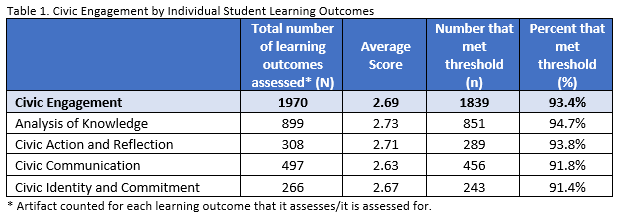
Conclusion: In 2024-25, 93.4% of students scored 2.00 or better; this meets the threshold of acceptability. With an average score of 2.69, the goal of 2.50 was also met.
Indirect Assessment 1: SDV Survey
Goal: SDV students will have an average satisfaction score with their professional readiness education of 3.00 or better. The maximum score is 4.00.
Threshold of Acceptability: 85% of respondents would rate their satisfaction with their civic engagement education as a 3.00 or better.
Results:

Conclusion: In 2024, 93.6% of SDV students rated their satisfaction with their civic engagement education as 3.00 or better; this meets the threshold of acceptability. With an average score of 3.30, this also meets the goal.
Indirect Assessment 2: Graduation Survey
Goal: Graduates will have an average satisfaction score with their professional readiness education of 3.00 or better. The maximum score is 4.00.
Threshold of Acceptability: 85% of respondents would rate their satisfaction with their civic engagement education as a 3.00 or better.
Results:

Conclusion: In 2024-25, 97.8% of graduates rated their satisfaction with their civic engagement education as 3.00 or better; this meets the threshold of acceptability. With an average score of 3.51, this also meets the goal.
Indirect Assessment 3: Voting Rates
Goal: 35% of eligible Virginia Western students will vote in the 2022 midterm elections.
Threshold of Acceptability: 30.6% of eligible Virginia Western students will vote in the 2022 midterm elections. This is the average for all participating institutions.
Results:
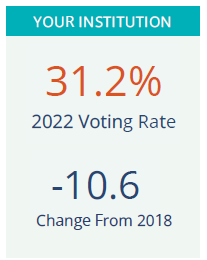
Conclusion: In 2022, 31.2% of eligible Virginia Western students voted in the national elections. This meets the threshold of acceptability (30.6%).
Quantitative Literacy
If you would like the complete report for Quantitative Literacy, please email ie@virginiawestern.edu.
Definition: Quantitative literacy is the ability to perform accurate calculations, interpret quantitative information, apply and analyze relevant numerical data, and use results to support conclusions.
Direct Assessment
Goal: Students will have an average score of 3.00 or better when assessed via the quantitative literacy rubric. The maximum score is 4.00.
Threshold of Acceptability: 75% of students will earn a score of 2.00 or better on the artifact-based quantitative literacy assessment. Additionally, students will have an average score of 2.00 or better.
Results:
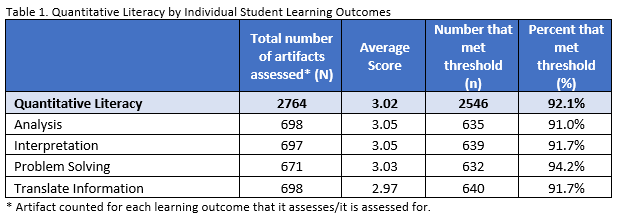
Conclusion: In 2022-23, 92.1% of artifacts scored 2.00 or better; this meets the threshold of acceptability. With an average score of 3.02, the goal of 3.00 was also met.
Indirect Assessment 1: Graduation Survey
Goal: 75% of respondents will rate their satisfaction with their quantitative literacy education as a 4.00 or better. The maximum score is 5.00.
Threshold of Acceptability: 85% of respondents would rate their satisfaction with their quantitative literacy education as a 3.00 or better.
Results:

Conclusion: In 2023, 96.7% of graduates rated their satisfaction with their quantitative literacy education as 3.00 or better; this meets the threshold of acceptability. With an average score of 4.45 this also meets the goal.
Indirect Assessment 2: Alumni Survey
Goal: 75% of respondents will rate their satisfaction with their quantitative literacy education as a 4.00 or better. The maximum score is 5.00.
Threshold of Acceptability: 85% of respondents would rate their satisfaction with their quantitative literacy education as a 3.00 or better.
Results:

Conclusion: In 2022, 98.5% of alumni rated their satisfaction with their quantitative literacy education as 3.00 or better; this meets the threshold of acceptability. With an average score of 4.27, this also meets the goal.
Written Communication
If you would like the complete report for Written Communication, please email ie@virginiawestern.edu.
Definition: Written communication is the ability to develop, convey, and exchange ideas in writing, as appropriate to a given context and audience.
Direct Assessment
Goal: Students will have an average score of 3.00 or better when assessed via the written communication rubric. The maximum score is 4.00.
Threshold of Acceptability: 75% of students will earn a score of 2.00 or better on the artifact-based written communication assessment. Additionally, students will have an average score of 2.00 or better.
Results:
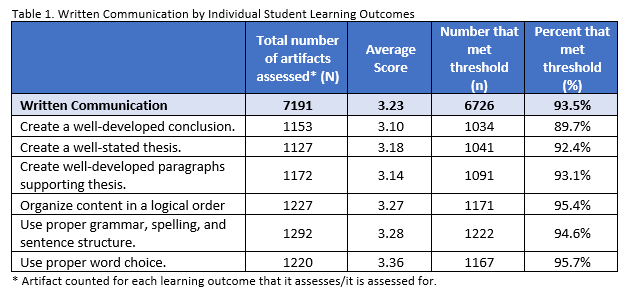
Conclusion: In 2022-23, 93.5% of artifacts scored 2.00 or better; this meets the threshold of acceptability. With an average score of 3.23, the goal of 3.00 was also met.
Indirect Assessment 1: Graduation Survey
Goal: 75% of respondents will rate their satisfaction with their written communication education as a 4.00 or better. The maximum score is 5.00.
Threshold of Acceptability: 85% of respondents would rate their satisfaction with their written communication education as a 3.00 or better.
Results:

Conclusion: In 2023, 98.3% of graduates rated their satisfaction with their written communication education as 3.00 or better; this meets the threshold of acceptability. With an average score of 4.52 this also meets the goal.
Indirect Assessment 2: Alumni Survey
Goal: 75% of respondents will rate their satisfaction with their written communication education as a 4.00 or better. The maximum score is 5.00.
Threshold of Acceptability: 85% of respondents would rate their satisfaction with their written communication education as a 3.00 or better.
Results:

Conclusion: In 2022, 97.7% of alumni rated their satisfaction with their written communication education as 3.00 or better; this meets the threshold of acceptability. With an average score of 4.29, this also meets the goal.
This page was updated May 29th, 2025.
Contact Us
ie@virginiawestern.edu
Fishburn Hall F110
Address:
3093 Colonial Ave., SW
Roanoke, VA 24015

